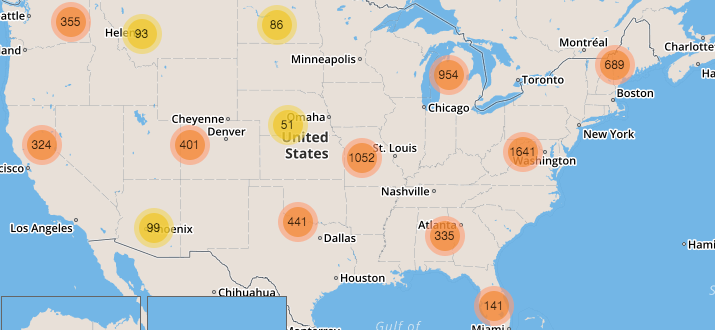Landmark Health Founder to Head Center for Medicare and Medicaid Innovation
Adam Boehler will take over CMS's value-based care test kitchen.

Screenshotted map from https://innovation.cms.gov displaying active Center for Medicare and Medicaid Innovation programs sorted by region.
Department of Health and Human Services (HHS) Secretary Alex Azar has appointed a new leader for the Center for Medicare and Medicaid Innovation (CMMI). Adam Boehler, who had been serving as CEO of home care company Landmark Health, will take over the organization within the Centers for Medicare and Medicaid Services (CMS).
The young CMMI is something of a test kitchen, chartered in the Affordable Care Act (ACA) to try out “innovative payment and service delivery models to reduce program expenditures” while “preserving or enhancing the quality of care furnished to individuals.”
As with many things ACA-related, its future became murkier when the Trump administration took office. Azar’s predecessor, Tom Price, had been critical of the program, but Azar himself expressed support for the CMMI during his confirmation hearings. Writing in a September 2017 editorial for the Wall Street Journal, CMS Administrator Seema Verma wrote that the program was a “powerful tool for improving quality and reducing costs,” and added that the administration planned to “lead the Innovation Center in a new direction.”
>>Read: CMS is Leading the Way Toward Bundled Payments. Should It Be?
Little is known of Boehler’s vision for the program. Prior to heading up Landmark Health, he helped launch and manage a number of healthcare companies, including laboratory assistance firm aLabs. He also served on the Board of Directors for Avalon Healthcare Solutions.
“Adam is widely regarded as an innovative leader in the private sector and in him we are lucky to have someone who has designed and implemented new, patient-focused approaches to healthcare delivery,” Verma reportedly wrote in a letter to CMS staff.
CMMI’s “new direction” has included the cancellation of a number of initiatives in recent months, including some of its bundled payment plans in late 2017 and the ending of a Direct Decision Support model in early 2018. The latter was meant to test out information programs for 700,000 patients whose medical conditions have no evidence-based consensus for best course of treatment.
“We are analyzing all Innovation Center models to determine what is working and should continue, and what isn’t and shouldn’t,” Verma wrote in her editorial prior to those cancellations. After cancelling the mandatory bundled payment programs, the agency announced that it was creating an expanded version of an older voluntary model.
Related Coverage:
GAO: States Spend $100B on Medicaid Demonstrations, with Limited Results
CMS Issues Final Rule to Cancel Mandatory Bundled Payments
HHS Awards $100 Million to Hospitals, Steps Back from Mandatory Bundles
Podcast: Match Made in Hospitals — Patient-Matching Technology Can Improve Healthcare
September 21st 2021Clay Ritchey, CEO of Verato, highlights the administrative and financial benefits that patient-matching technology can provide hospitals and health systems, as well as how it can improve the patient experience.
Podcast: Using Digital Solutions to Address Technology Shortfalls with Citius Tech Senior VPs
July 29th 2021In an interview recorded earlier this year, Chief Healthcare Executive Associate Editorial Director Mary Caffrey spoke with 2 leaders of Citius Tech about meeting healthcare challenges with digital solutions.